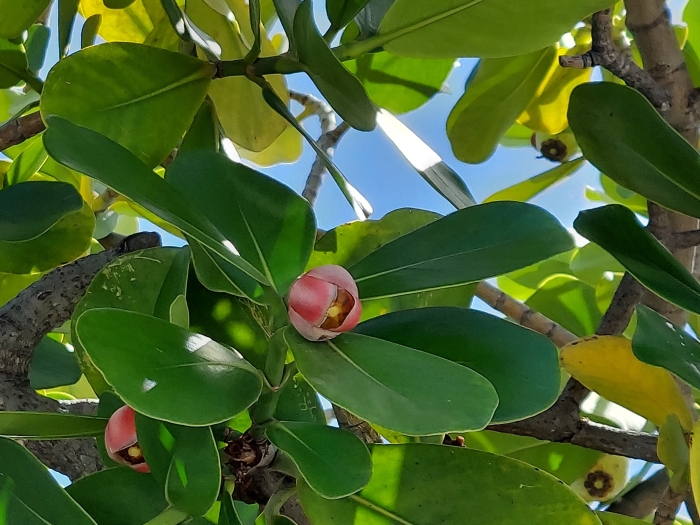Autograph Tree
(Clusia rosea)
Autograph Tree (Clusia rosea)
/
/

© florawhite
CC BY 4.0
Image By:
© florawhite
Recorded By:
Copyright:
CC BY 4.0
Copyright Notice:
Photo by: © florawhite | License Type: CC BY 4.0 | License URL: http://creativecommons.org/licenses/by/4.0/ | Uploader: florawhite | Publisher: iNaturalist |
























Estimated Native Range
Summary
Clusia rosea, commonly known as the Autograph Tree, is an evergreen tree native to tropical forests, coastal swamps, and rocky areas in the Caribbean, including the Bahamas, Hispaniola, Cuba, Puerto Rico, and Florida and extending to Venezuela and Ecuador. It is often found as a hemiepiphyte, starting life as an epiphyte and eventually strangling its host tree as it grows. This species can reach up to 20 feet (6 meters) in height and width, with thick, leathery leaves that are dark green and glossy, often inscribed with names or initials, giving rise to its common name.
The Autograph Tree is notable for its large, showy flowers with pink to white petals that bloom sporadically throughout the year, and its fleshy, apple-sized fruit that is toxic if ingested. In cultivation, it is used for ornamental purposes, such as in tropical gardens, urban landscapes, and as a potted houseplant. It thrives in full sun to part shade, requires well-drained soil, and is tolerant of drought and salt spray, making it suitable for coastal conditions. However, it can become invasive outside its native range, so it is important to check local regulations before planting. Clusia rosea is relatively low maintenance but can suffer from root rot if overwatered.CC BY-SA 4.0
The Autograph Tree is notable for its large, showy flowers with pink to white petals that bloom sporadically throughout the year, and its fleshy, apple-sized fruit that is toxic if ingested. In cultivation, it is used for ornamental purposes, such as in tropical gardens, urban landscapes, and as a potted houseplant. It thrives in full sun to part shade, requires well-drained soil, and is tolerant of drought and salt spray, making it suitable for coastal conditions. However, it can become invasive outside its native range, so it is important to check local regulations before planting. Clusia rosea is relatively low maintenance but can suffer from root rot if overwatered.CC BY-SA 4.0
Plant Description
- Plant Type: Shrub, Tree
- Height: 25-30 feet
- Width: 15-25 feet
- Growth Rate: Moderate
- Flower Color: Pink, White
- Flowering Season: Spring, Summer
- Leaf Retention: Evergreen
Growth Requirements
- Sun: Full Sun, Part Shade
- Water: Medium
- Drainage: Fast, Medium
Common Uses
Border Plant, Hedges, Low Maintenance, Potted Plant, Street Planting
Natural Habitat
native to tropical forests, coastal swamps, and rocky areas in the Caribbean, including the Bahamas, Hispaniola, Cuba, Puerto Rico, and Florida and extending to Venezuela and Ecuador
Other Names
Common Names: Scotch Attorney , Pitch Apple
Scientific Names: Clusia rosea , Birolia alba , Clusia retusa , Clusia silvicola , Elwertia retusa , Firkea rosea
GBIF Accepted Name: